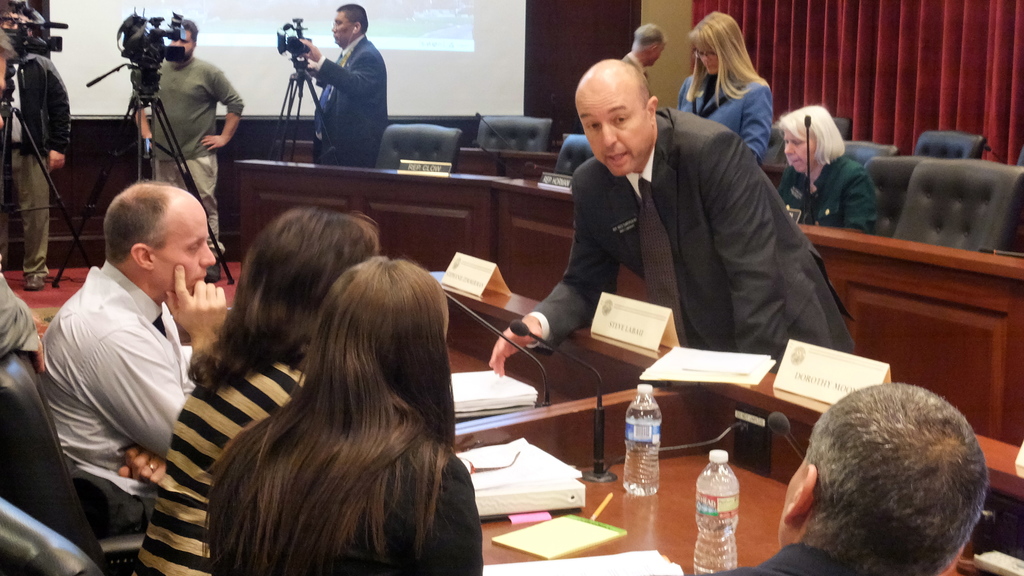Wednesday’s Common Core forum filled the Statehouse’s largest auditorium – but likely didn’t resolve the ongoing debate over the new school standards.
The meeting was billed as a chance for Idahoans to submit their questions to experts, and get answers about the Idaho Core Standards in English language arts and math.

About 200 people packed the Statehouse’s Lincoln Auditorium to near capacity. But what they heard were conflicting assertions, and a rehashing of the major themes of a yearlong debate over the standards, adopted by the 2011 Legislature.
At one point, the experts – three supporting the standards, three opposing them – split on the question of whether teachers had input in shaping the standards and the associated test.
Here’s what they said.
Dorothy Moon, a retired educator and special education instructor from Challis: “No, corporate giants were involved.”
Steve LaBau, principal of Nampa’s Lake Ridge Elementary: “Teachers were involved in the creation of standards.”
Stephanie Zimmerman, founder of Idahoans for Local Education: “No, they were brought in after the fact as window dressing.”
Superintendent of Public Instruction Tom Luna: “Teachers have been involved with the process. Ask the leaders of the Idaho Education Association, they know by name, today, the Idaho teachers involved in developing questions used on the (Common Core-aligned test, the Smarter Balanced Assessment Consortium).”
At another point, Zimmerman said the State Board of Education sets curriculum, not locally elected school boards. That raised a red flag with Rep. Wendy Horman, an Idaho Falls Republican and a longtime member of the Bonneville district School Board.
“It’s hard for me as a former school board member to sit and listen to someone tell me that school boards are not involved in deciding curriculum because I was there, I did it,” Horman said after the meeting. “I know then when comments are made later, I have to ask the same question: Do they know that or do they not?”

During the meeting, no new bills were introduced and nobody from the audience was allowed to ask questions. Lawmakers didn’t even ask questions – even though the format allowed for legislators to seek follow-up information.
The panel included:
- Madison School District director of curriculum and staff development Bruce Cook.
- Council School District English teacher Stephanie Rice.
- Zimmerman.
- Moon.
- LaBau.
- Luna.
The opponents (Cook, Zimmerman and Moon) raised several arguments:
- The standards are untested.
- The standards represent too much government intrusion in education policy.
- The standards may not fit with special education students who struggle.
- Student data may be compromised.
- The standards seize control from local school boards, teachers and parents.
The supporters (Luna, LaBau and Rice) also had several recurring arguments:
- The standards raise the bar academically.
- The standards provide a system where student progress and readiness can be compared to peers in other states.
- The standards will better prepare students to enter college or the work force without remediation.
- The standards preserve local control. School boards can still set curriculum and teachers will be able to decide how to prepare their students.
Sen. Janie Ward-Engelking, a Boise Democrat, said she wasn’t concerned by the differing answers. One explanation, she suggested, was that Idaho is a big state and people in some corners may not have been aware that teachers helped shape standards or write assessment questions.

“It was a great format, it’s great to hear the pros and cons to make sure I understood both sides,” she said. “As a legislator and policymaker you need to understand what the fears are and all the concerns of the constituents in Idaho.”
In the end, Horman and Ward-Engelking said they walked away from the meeting realizing that concerns over student data are widespread and sensitive information needs to be continuously protected.
More reading: Our real-time rundown of Wednesday’s forum, in Storify format.
